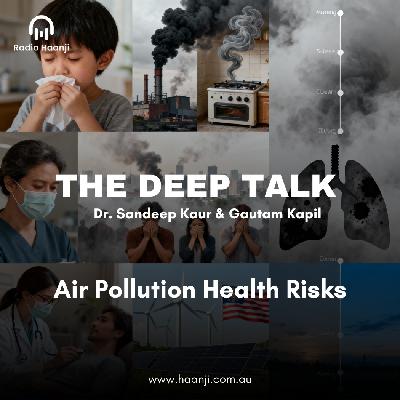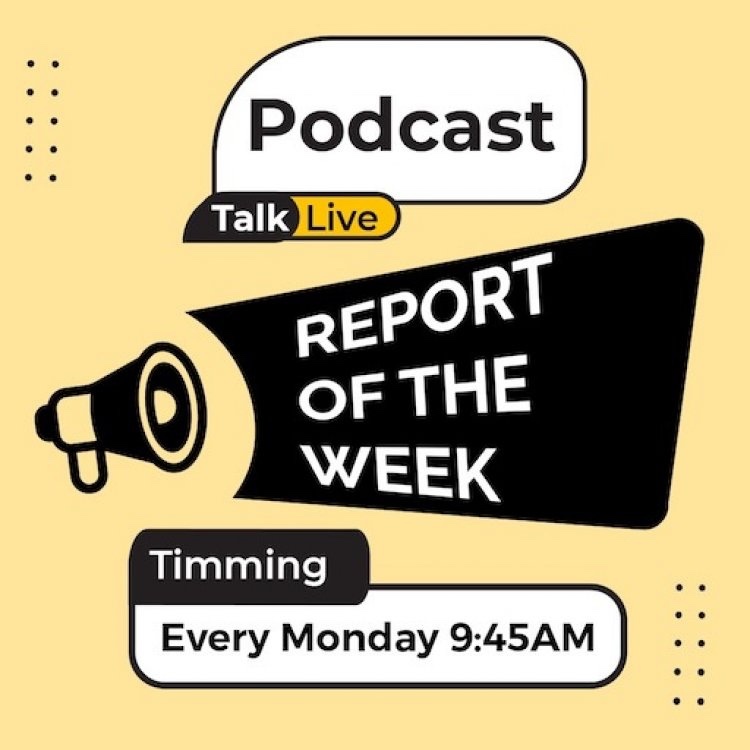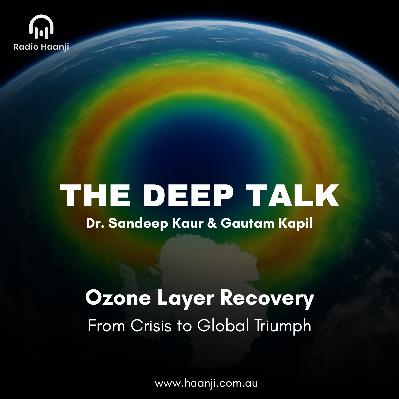Air Pollution Health Risks: Causes, Deadly Impacts & Simple Solutions - The Deep Talk
Description
Imagine taking a deep breath on a bustling city street, unaware that the air you're inhaling carries tiny invaders more lethal than many viruses—ones linked to 8.1 million premature deaths worldwide each year. As a health and environment writer with over a decade covering global wellness trends, I've seen how air pollution sneaks up on us, rivaling high blood pressure and obesity as a top health threat. This article, inspired by an eye-opening podcast episode, breaks down the causes, human toll, worldwide pushback, and easy tweaks you can make today for cleaner air tomorrow. Whether you're a parent safeguarding your kids' future or just tired of hazy skies, you'll walk away empowered.
Understanding Air Pollution: What Exactly Are We Breathing?
Air pollution isn't just smog blanketing distant cities—it's the fine particles and gases infiltrating our lungs, homes, and ecosystems daily. These pollutants, like particulate matter (PM2.5), ozone, and nitrogen dioxide, come from everyday activities and industrial might. In 2025, nearly 99% of the global population breathes air exceeding safe limits, with low- and middle-income countries hit hardest.
The podcast hosts dive deep here, painting a vivid picture: household stoves in rural villages puffing out as much harm as urban traffic jams. This invisible mix doesn't just dirty the sky—it seeps into our bloodstream, triggering inflammation and long-term damage. But here's the silver lining: awareness is the first step to action.
How Does Air Pollution Cause Such Devastating Health Risks?
Breathe in, and those tiny particles—smaller than a human hair—lodge deep in your lungs, entering your blood and organs. The effects of air pollution mimic a slow-burning fire inside the body: chronic inflammation leads to heart disease, strokes, lung cancer, and even diabetes flare-ups. It worsens existing conditions like high blood sugar and obesity by disrupting metabolism and insulin sensitivity.
Recent studies show links to cognitive decline and dementia, too—air pollution health risks extend beyond the lungs to the brain. In children, it stunts lung development; in adults, it accelerates aging. The podcast emphasizes how this ties into broader risks like malnutrition, as polluted air hampers nutrient absorption in vulnerable communities.
Key stats to chew on:
- 68% of outdoor pollution deaths stem from heart disease and stroke.
- Household pollution alone claims 3.2 million lives yearly from cooking fuels.
Is Air Pollution Really the Second Leading Risk for Death Worldwide?
Yes, and the numbers are staggering. In 2021 data updated for 2025 trends, air pollution caused 8.1 million premature deaths globally, edging out just behind high blood pressure as the top risk factor. That's one death every 4 seconds, often from invisible assaults like fine particles that penetrate deep into tissues.
The podcast hosts unpack this with real stories: a Delhi family grappling with asthma epidemics, or Beijing elders facing shortened lifespans. Unlike obesity or high blood sugar, which we can often manage personally, air pollution's scale demands collective action—yet its personal toll is profoundly isolating.
For context:
Risk Factor
Annual Premature Deaths (Millions)
Key Impacts
High Blood Pressure
10.8
Strokes, heart attacks
Air Pollution
8.1
Respiratory diseases, cancer
Tobacco
8.0
Lung issues, cardiovascular
High Blood Sugar
6.7
Diabetes complications
Malnutrition
5.5
Weakened immunity, stunting
Obesity
4.7
Metabolic disorders
This table underscores why the episode calls it a "silent pandemic"—it's everywhere, yet overlooked.
If you're feeling the weight of this, stick around: solutions are within reach.
The Hidden Causes: From Your Kitchen to Global Factories
Air pollution causes span the globe, blending local habits with industrial giants. At home, burning wood or coal for cooking releases black carbon and toxins—exposing 2.4 billion people, mostly in Asia and Africa. On roads, vehicle exhaust pumps out nitrogen oxides; factories spew sulfur dioxide.
The podcast spotlights "household fuels" as the sneaky culprit—simple stoves in developing regions rival coal plants in harm. Add wildfires, agriculture waste burning, and power plants, and you've got a toxic cocktail fueling climate change too.
Urban dwellers might think it's all cars, but indoor sources like poorly ventilated heaters contribute 50% of personal exposure. Unpacking these layers reveals how interconnected our actions are.
What Are the Main Sources of Air Pollution?
The podcast boils it down to five heavy hitters, each with outsized effects:
- Household Combustion: Kerosene, biomass, and coal stoves—3.2 million deaths linked.
- Transportation: Diesel vehicles and traffic congestion, causing 53,000 U.S. deaths alone.
- Industry and Power: Factories and coal plants emitting PM2.5.
- Agriculture and Waste: Crop burning and landfills releasing methane.
- Natural Events Amplified: Wildfires, worsened by climate change.
Addressing these isn't about blame—it's about smarter swaps, as the hosts urge.
Ready to fight back globally? Let's look at the big picture.
Global Responses: Hope on the Horizon for Cleaner Skies
Nations aren't standing idle. The World Health Organization's 2025 roadmap aims to halve air pollution deaths by 2040 through clean energy shifts and urban planning. China's emission cuts have cleared eastern skies; Europe's strict standards slash vehicle pollutants by 40%.
The podcast celebrates wins like India's electric bus boom and U.S. clean air acts preventing thousands of deaths. Yet challenges persist—developing regions lag in funding. International pacts, like the UN's pollution action plan, tie air quality to climate goals for double impact.
These efforts prove: collective will turns hazy hopes into breathable reality.
What International Efforts Are Combating Air Pollution in 2025?
In 2025, momentum builds with targeted initiatives:
- WHO Roadmap: Endorses sustainable transport and energy, targeting 50% death reduction by 2040.
- UN WMO Bulletin: Monitors aerosols from wildfires and shipping, pushing for global emission caps.
- U.S. State of the Air Report: Exposes half the population to risky levels, spurring federal grants for green tech.
- World Bank Projections: Predicts halving high-exposure populations via investments in low-carbon policies.
These aren't pipe dreams—they're funded blueprints saving lives.
Small Changes, Big Impact: How to Reduce Air Pollution in Your Daily Life
You don't need superpowers—just intention. The podcast wraps with empowering routines: swap car commutes for bikes, opt for electric appliances, and plant trees in your yard. These micro-shifts cut personal emissions by up to 20% while pressuring bigger change.
Start small: unplug unused gadgets to slash energy waste, or choose public transit twice weekly. For families, it's about legacy—cleaner air for kids' playtime outdoors.
The ripple? Communities transform, and global stats shift.
What Simple Steps Can I Take Today to Breathe Cleaner Air?
Here's your starter kit, podcast-inspired and science-backed:
- Ditch the Drive: Carpool or walk—reduces exhaust by 30% per trip.
- Kitchen Clean-Up: Switch to induction stoves or clean fuels—halves household pollution.
- Energy Savers: LED bulbs and efficient AC—cuts power plant emissions.
- Green Commute: Bike or e-scooter for short hauls.
- Advocate Locally: Support clean air policies via petitions.
- Indoor Air Check: Use HEPA filters and ventilate naturally.
- Mindful Consumption: Buy less plastic, recycle more—tamps waste burning.
Track your progress with apps like AirVisual. One change today? That's oxygen for tomorrow.
What step will you try first? Share in the comments below—we'd love to hear and feature your story!
Key Takeaways
- Air pollution health risks cause 8.1 million premature deaths yearly, second only to high blood pressure.
- Causes range from household fuels (3.2M deaths) to industrial emissions—fixable with swaps.
- Global 2025 efforts like WHO's roadmap promise halved deaths by 2040.
- Personal actions: Bike more, clean-cook, save energy—your routine matters for generations.
Subscribe to our newsletter for more health hacks, and let's clear the air together—share this if it sparked change!
Frequently Asked Questions
What are the top air pollution health risks besides premature deaths?
Air pollution exacerbates heart disease, strokes, lung cancer, and chronic respiratory issues. It also links to diabetes, obesity, and cognitive decline by inflaming tissues and disrupting hormones.
How does household air pollution compare to outdoor sources?
Household sources like cooking fuels cause 3.2 million deaths annually, rivaling outdoor traffic and industry. Both contribute to the 8.1 million total, but indoors hits vulnerable groups like women and children hardest.
Can air pollution really worsen conditions like high blood sugar or obesity?
Yes—pollutants interfere with insulin and metabolism, increasing diabetes risk by up to 20% in high-exposure areas. It also promotes inflammation tied to weight gain.
What role do wildfires play in air pollution health risks?
Wildfires amplify PM2.5 levels, causing short-term spikes in asthma attacks and long-term heart issues. In 2025, they're worsened by climate change, adding millions to global exposure.
Are there effective global policies reducing air pollution in 2025?
Absolutely—the WHO's roadmap and UN emission caps aim for 50% fewer deaths by 2040. Success stories includ






















